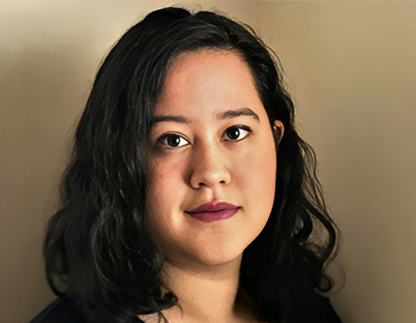I would advise my younger self to take up more space, especially in spaces that were not created for people of color and queer folxs, including academia.”
Alicia V. Nuñez (she/her)
PhD Candidate in the Department of Spanish and Portuguese

Alicia V. Nuñez is a PhD candidate in the Department of Spanish and Portuguese in the Weinberg College of Arts and Sciences. Her dissertation, "Shadow Kids: The Child in Central American Migrant Narratives," aims to comprehend both the real and symbolic functions that children play in discourses around Central American migration. Alicia was awarded a Presidential Fellowship, a Latina/o Studies Graduate Assistantship, and was selected for the Social Science Research Council Dissertation Proposal Development Program.
How would you describe your research and/or work to a non-academic audience?
In my dissertation, I look at the ways migrant children from Central America are portrayed in the media, in government discourses, and in migration literature. The literary materials and artistic expressions of migration that I study are crucial in understanding child migrants through a more holistic lens. In my project, migration is a multisensory phenomenon where child migrants move across different social, political, linguistic, temporal, and sexual borders.
What have been some of the most memorable twists and turns of your career?
In my third year, I had an accident that required two surgeries and eight months of physical therapy. I taught my first class as a primary instructor with a cast and sling on. My students in the Latinx program were so patient and supportive. It was a difficult time, but I was motivated to give my students the best class I could.
Tell us what inspired your research and/or work.
Personally, my interventions are tied to my experiences as the daughter of asylum seekers. My parents migrated to the U.S. because of the Salvadoran and Guatemalan civil wars, and the majority of my family continues to be undocumented. These experiences directly impacted my academic work. As a Central American scholar, I continue to fight for human rights and policy change on local, state, and transnational levels.
What do you find both rewarding and challenging about your research and/or work?
It is exhausting to write and read about experiences that are so close to home. Throughout my doctoral journey, I have learned to set boundaries so that my work does not consume me. Yet I have also learned that the personal is political. I am driven to continue my research and teaching because I am fighting for people who do not have the same privileges and access to resources as I do.
What books are on your bedside table?
I currently have three books on my bedside table. The first is Javier Zamora's Solito: A Memoir, which recounts his journey from El Salvador to the U.S. as a child. The second is Christopher (Loma) Soto's book of poems, Diaries of a Terrorist, which exudes queer punk raunchiness. And finally, On Earth We're Briefly Gorgeous by Ocean Vuong is a book I return to often because of its painful beauty.
What advice would you give your younger self or someone considering a similar path?
I would advise my younger self to take up more space, especially in spaces that were not created for people of color and queer folxs, including academia. People like me are told to be silent and not cause too much trouble. If I had followed that advice, I would never have made it to where I am now.
Published: April 4, 2023
If you know a graduate student, postdoctoral trainee, graduate faculty member, staff member, or a member of our TGS alumni population who would make a great candidate for our TGS Spotlight Series, please complete this brief TGS Spotlight Series Nomination Form.